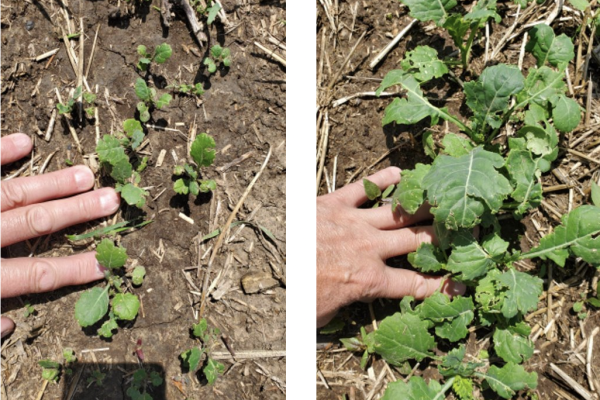In our “Soil Solutions” series we’ve covered how biofertilizers help soil health and increase yield without damaging soil. In our final edition, we want to discuss what you, the customer, thinks of Replenish Nutrients.
In our customer survey, we asked: Which words do you feel closely reflect Replenish Nutrients’ products?
We couldn’t be happier that “biofertilizer” and “innovative” were tied. We are also excited that the majority of people relate our products with “sustainability.”
So how do our products create sustainability?
When synthetic fertilizers are over-applied it alters the soil’s natural balance by creating too high of a salt concentration and an imbalance of nutrients. This can create an environment where beneficial microorganisms are unable to survive. The result? Dead soil.
With Replenish Nutrients, we not only enrich the soil, we revive it. So even if you have years of conventional fertilizer use, we can bring your soil back to life. We do this through various ways, such as:
- Nutrient availability: Builds soil health through biological processes, optimizing plant nutrient availability and uptake for improved plant growth.
- Unlock tied-up nutrients: Increase soil microorganisms to improve breakdown and cycling of nutrients and increase the bioavailability of nutrients for plants.
- Zero leaching or volatilization: Our fertilizer stays where you put it so the plant can access it when it needs it most, instead of flushing downstream in the next rain.
- Low salt content: Our products have a low salt load making sure your soil stays balanced and in optimal condition to grow plants.
Natural sources for sustainable inputs
Not only do our products include superior, plant-available nutrients, they’re derived from natural mineral sources.
Sulphur
Sulphur is a key component for producing amino acids and is especially important to plants in the early stage of growth to produce amino acids and protein. It is essential in all crop systems and a shortage can lead to decreases in yield and protein levels.
We use elemental sulphur, which is an oil and gas by product. And while it’s true that elemental sulphur in its natural state is not plant-available, our micro biology converts it to a sulphate form, that is available to the plant. In fact, the plant can now draw on sulphur whenever necessary as the soil is in the right condition to convert it.
Phosphorus
Phosphorus in plants is key in capturing, storing, and converting the sun’s energy into biomolecules that drive biochemical reactions (e.g., photosynthesis) from germination through grain formation to maturity. Phosphorus promotes early root growth, winter hardiness, and seed formation, stimulates tillering, and increases water use efficiency. Plants deficient in phosphorus are stunted in growth and often have an abnormal dark-green color.
Our formulations convert and make mineral phos and component nutrients available in the soil. How? Our proprietary activated compost. When blended with elemental sulphur allows the formulation to:
- Create a biogenic organic acid burst in the soil.
- React and consume the raw minerals, breaking the molecular bonds that tie up nutrients in the soil and rock phosphate and convert to plant available form.
The nutrients are made available to the plant for uptake during the growing season on a as needed basis, meaning you don’t lose the much-needed – and expensive – nutrients.
Potash
Potash is a common name for various salts that contain potassium in water-soluble form. Potassium is one of the essential macronutrients required for the healthy growth and development of plants. It plays a vital role in several plant processes, including photosynthesis, protein synthesis, water uptake, and stress tolerance The purpose of potash is to supply plants with the necessary potassium they need for optimal growth and yield. Otherwise, a potassium deficiency can lead to stunted growth, reduced crop yields, and increased susceptibility to disease and pests.
Replenish Nutrients products provide plants with a sufficient supply of potash. This means our fertilizers help to ensure that the plants have the nutrients they need to thrive and produce healthy, high-quality crops.
Compost
Compost is often included in biofertilizers because it is a rich source of nutrients that can help support plant growth. Composting is the process of decomposing organic matter, such as food waste, leaves, and other yard debris, into a nutrient-rich soil amendment.
The resulting proprietary activated compost allows Replenish Nutrients to produce a natural fertilizer that contains a balanced mix of solubilizing bacteria and fungi, and essential nutrients – including nitrogen, phosphorus, and potassium, as well as micronutrients like calcium, magnesium, and sulphur.
Bringing life back into the soil
Our customers trust Replenish Nutrients because our products not only create life (crops) they also include life (microorganisms).
Biofertilizers are low-cost renewable sources of plant nutrients. Biofertilizers also generate plant nutrients like nitrogen and phosphorus through their activities in the soil or rhizosphere and make them available to the roots in the soil.
Because we produce biofertilizers, our products contain living microorganisms, such as bacteria, fungi, and other beneficial microbes. This helps improve soil health and promote plant growth. When compost is added to a biofertilizer, it can help provide a food source for these microorganisms, which can help them thrive and be more effective at promoting plant growth. Additionally, the organic matter in compost can help improve soil structure, water-holding capacity, and drainage, all of which can benefit plant growth.
Conventional processes, sustainable solutions
Our products combine sustainable sources of nutrients to mimic the conventional process, without harming the environment or impacting yield.
How it works
- The compost delivers the required microbes to solubilize raw minerals (rock phosphate, potash, elemental sulphur) into an available form for plant nutrient uptake.
- The combination of ingredients creates biogenic organic acids that mimics the conventional fertilizer production process to deliver nutrients to the plant.
- The microbial components in our products (from compost) interact and bond with the soil microbes to anchor and facilitate the timely release of nutrients.
- The compost ‘acts like a probiotic’ by feeding the hordes of beneficial fungal and bacteriological material present in the soil.
The result
- Soil Quality: Builds diversity, functionality, and resistance of microbial species in the soil. Improving the plant’s functionality, hormone production, and stress adaptation. A barley study using our products found the plants ability to transport the vital nutrient manganese increased by 91%.
- Yield: Produces an equivalent or better yield with real ecological benefits. One study found a yield increase of 8.9% over MAP.
- ROI: Added microbial diversity and variety in the soil improves insecticide agents which means a decrease in use of herbicides, fungicides.
- Nutrient Management: Optimizing nutrient management is simply good business in dealing with fluctuations in prices of fertilizers and other inputs.
- Climate Change Mitigation: Composting can divert organic waste from landfills, which can reduce greenhouse gas emissions. Additionally, compost can sequester carbon in the soil, which can help mitigate climate change. Our zero waste, non-chemical process reduces our carbon footprint by almost half a tonne of carbon, per tonne of Rebuilder, versus the business as usual case of utilizing chemical fertilizers.
Don’t worry – you don’t have to take our word for it. Biome Makers, our research partners, examined our products through its BeCrop Trial. Check out the webinar with peer-reviewed results.


